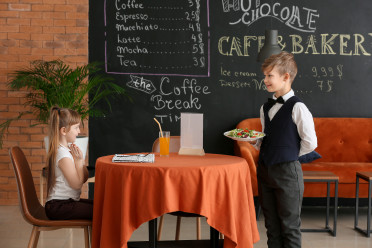
Make-Believe Restaurant
Take turns playing chef, waiter, diner and cashier. This worksgreat for two kids, a child and an adult, or a small group of kids and adults. Use a play kitchen or make the kitchen cabinets, pretend food and appliances out of cardboard boxes and other repurposed household or craft items.
Level Up:
Use play money (or real money) to learn about the value of different forms of currency.
Conversation Sparks
What did you like best about playing each role — chef, waiter, diner, etc.? What type of restaurant would you like to work in? What type of food would you like to learn to cook?

Money Mania
Use real money to teach kids the value of coins and currency. Use a toy cash register (or cash box that you might have for a garage sale) to play bank or store. One child or adult can be the customer and one the cashier/banker. Have the child count out actual money to learn the value of different currency. Use coins to show the equivalent of a dollar bill.
Level Up:
Set up a store with items for sale (toys, books, craft items, stuffed animals) and use stickers to price them (as you would for a garage sale). Then, let the “customer” go shopping, pick a selection of items, add up the totals and pay for their purchases with the cashier. With older kids, add complexity by using larger bills for payment, and help them learn to make change!
Conversation Sparks
Do you remember how many cents a quarter is worth? Which is worth more — three quarters or one dollar? If this toy costs $3 and I paid with a $5 bill, how much change would the cashier give me back after I paid?

Office Antics
Set up a kid-sized office with a desk, chairs, computers, phones, printers and other office items. Use or borrow household items to set up the office. Don’t forget desk accessories and supplies like staplers, tape dispensers, pencil cups and file folders. Then, take turns playing the office worker and the client who comes in and needs to be helped.
Level Up:
Decide what kind of office this is — A lawyer’s office? An accountant’s office? What kind of work would be done in that kind of office? Then roleplay those types of activities.
Conversation Sparks
How do you greet someone who enters an office? What would you say to answer the phone? What supplies, equipment or tools would be needed in this office to do the work?
Job Interview Roleplay
This dramatic-play scenario works well with at least two people — either two children with an adult directing the play, or an adult and a child. Decide what kind of business this is. One person is the employer who needs to hire someone for a job, and the other is the candidate being interviewed for a job. After playing this once, switch roles and play again. Ask the job candidate to make up answers to questions like:
- Why do you want to work at my office/store/laboratory?
- What do you think you’ll do every day at my office/store/laboratory?
- What would you need me to teach you how to do to work here?
- What questions do you have for me about working here?
The job candidate can ask questions of the employer, such as:
- What will I do in this job?
- Will I work inside or outside?
- Why would I want to work here?
- How much are you going to pay me to work for you?
Level Up:
This can be played with multiple job candidates — and then the “employer” can decide which person is the best fit for the job! This game can be played over and over by roleplaying different types of jobs — retail clerk, bus driver, pizza delivery person, chef, zookeeper and so forth. Throw in some fun ones like ice cream cone-maker or juggler! Changing up the job keeps the dramatic play fresh and inspires kids to think more deeply about different jobs.
Conversation Sparks
Which question was the hardest to answer? Which answer made you want to work for the employer — or didn’t make you want to work for them?
What’s the Scoop?
Interview an adult friend or family member about their job. This can be done in person, by phone, over email or via a video conferencing program. Ask questions like:
- What do you do in your job?
- Where do you work?
- How did you learn the skills you need to do your job?
- What do you like best about your job?
- What do you like least about your job?
- Do you think you’ll do this job forever, or do you want to do a different job someday?
- Is this a job you think I’d like to do someday?
- What would I see if I visited you at work?
Level Up:
Have the child either record or take notes and then put together a story, podcast or video explaining what the person does for their job. They can send the person the final result as a thank you for agreeing to be interviewed.
Conversation Sparks
What did you learn about the person’s job that surprised you? What do you think you’d like about their job? What do you think you’d hate?
Fun with Flight
Turn your living room or backyard into an airplane with chairs, boxes and other household items. You and your kids can be the pilot, copilot, air traffic controller, luggage handler and flight attendants. Use stuffed animals as passengers.
Level Up:
Similar scenarios can be set up for other types of transportation — buses, delivery trucks, boats, trains, subways, spaceship, cabs, etc. You can include other jobs such as police officers, ticket takers, store owners, people who’ve called for a ride, etc.
As the director of this game, adults can introduce different types of challenges to shake up the scenario such as rain, snow, wind, deer in the road, birds, floods, other vehicles, etc.
Conversation Sparks
What job on the plane (or other vehicle) would you most like to have? What type of vehicle would you like to drive for a job? Which types of vehicles have you ridden on before? What vehicle do you dream about driving someday?

Doctor’s Office
This is a great way to roleplay what it’s like to work in a medical job and it can be played with two kids or a group. It could also be a way to get a child to relax before an appointment they’re nervous about! Talk about the different roles in a doctor’s office, and what each person does. Possible roles include the patient, receptionist, medical technician, nurse or doctor.
Level Up:
Older kids might find it more exciting to play Emergency Room and make up scenarios for why someone might be rushed in for treatment. You can provide basic medical equipment — thermometers, bandages, braces, creams, crutches — to make the play seem more realistic. Candies, nuts, dried cereal or fruit snacks can work as medicines!
Conversation Sparks
What type of problems do people often have when they need to go to the doctor’s office or hospital? How does the doctor get the information they need to assess what’s wrong? What other jobs do people do in a doctor’s office?
School Daze
Many kids love to play school with friends or siblings at home (especially in the years leading up to kindergarten). Playing school can consist of setting up your living room or backyard to have different desks for the students (boxes can work), a teacher’s desk, a whiteboard or chalkboard, workbooks and other learning toys and games. Older kids love to play teacher to the younger ones, and this can be a great peer-to-peer activity for older sibs to teach younger kids basics such as colors, numbers and simple math. And don’t forget the teacher can choose one of their favorite books for a read-aloud when everyone starts to get tired!
Level Up:
As kids get older, you, a babysitter or older sibling can always play the teacher and work on all kinds of age- and skill-appropriate learning enrichment games.
Conversation Sparks
Was it hard to get the kids to pay attention to you when you were the teacher? Did playing the teacher make you think differently about how you behave in class? Would you like to be a teacher someday?

Grocery Shopping
Give your child a play shopping cart or a reusable shopping bag, and let them “shop” in your pantry, refrigerator or kitchen cupboards for weekly groceries or a special event like a pretend party. Or, set up a store on your dining room table and let them stock items to “sell.” Take turns playing cashier (see Money Mania, above) and customer. Tip: This is a great game to play on the days you need to clean out cabinets or your fridge!
Level Up:
Put stickers on each product with prices. Have your child add up the prices of their items, pay with real currency and make change. Give them a set budget before they start shopping and then see if they can keep their total within that amount.
Conversation Sparks
What different types of jobs are there in the food industry, from farm to table? How do the food items get to the store? How can you stay within a budget while you’re shopping?

Thrifty Threads
In this project developed Kansas 4-H Youth Development, kids will learn how to stretch a clothing budget by shopping at thrift stores.
Level Up:
Develop a plan to recycle your clothing.
Conversation Sparks
What did you learn about clothing available at a thrift store?
Other Activities:
STEAM-based Activities Career Activities in Your Community Kansas Field Trips
